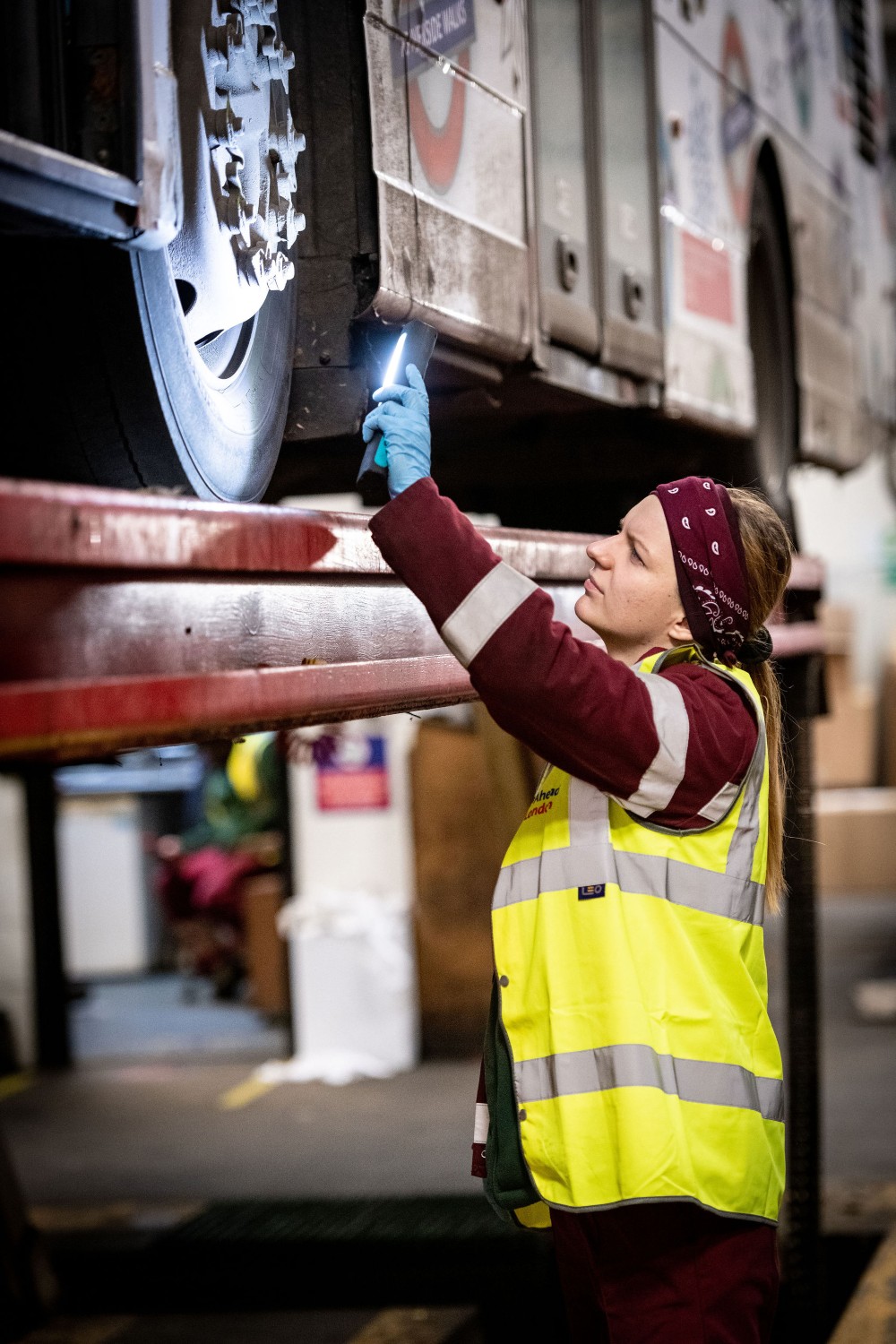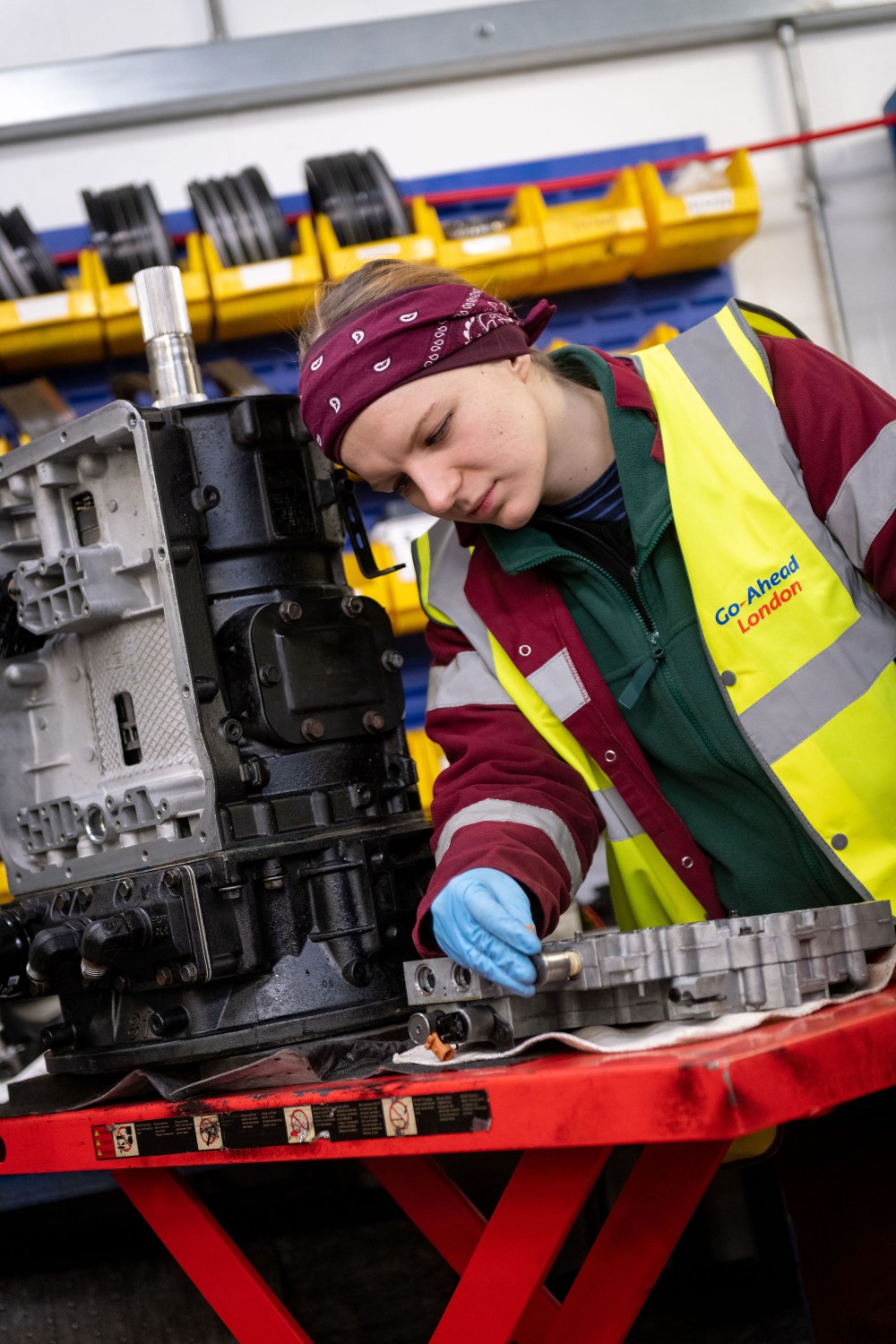Simple steps could unlock thousands more apprenticeships
Apprentice Engineer, Alicja Juszczyk, Camberwell Bus Academy
Scott Maynard, Group HR Director
| Go-Ahead
It’s not often that you get to turn a hobby into a career. But Alicja Juszczyk has been fortunate enough to do just that.
A former special educational needs teacher, Alicja, 26, has always enjoyed tinkering with engines – she even acquired vintage buses from time to time, and restored them to take to rallies.
She spotted the opportunity to join Go-Ahead London, the capital’s biggest bus operator, as an apprentice engineer in 2020 and is now an expert at her craft – she can be called upon, for example, to fix a propellor shaft for a gearbox on a double-decker bus.
“Engineering is quite a broad area, there’s electrics and mechanical and bus body work so there’s a lot of different areas you can go into, says Alisha. “I’m aware that being a bus engineer is a male dominated industry and it doesn’t bother me in the slightest. This is my interest, so why does it matter?”
The Go-Ahead Group is the largest apprenticeship provider in public transport. This year, we’re planning to take on 1,020 apprentices – of whom around 220 will become train drivers and engineers at Govia Thameslink Railway, and the rest will work at our bus companies in London and around the country.
 We’re very proud of the apprenticeships we offer, with teaching ranging from Level Two (GCSE level) up to Level Seven (equivalent to a masters degree). All of our apprentices get to earn while they learn, interspersing stints in a classroom with periods out on the road or railway.
We’re very proud of the apprenticeships we offer, with teaching ranging from Level Two (GCSE level) up to Level Seven (equivalent to a masters degree). All of our apprentices get to earn while they learn, interspersing stints in a classroom with periods out on the road or railway.
We’d like to do more. It’s no secret that there’s a nationwide shortage of bus drivers, and that the employment market is tight across the transport industry. Apprentices, to us, are valuable investments – those who join us as apprentices stay with us for longer, get high feedback from passengers and add diversity to our business.
Unfortunately, though, the structure of the Apprenticeships Levy has made it difficult for us to push up our intake higher. Although we support the levy in principle, and applaud its goals in encouraging companies to invest in training, its complexity and rigidity is proving a barrier.
For those unfamiliar, the levy sounds straightforward. Companies over a certain size are required to pay 0.5% of their payroll as a levy. They can then claim this money back, topped up with extra from the Government, to fund apprenticeships. But the rules around it are complex.
For example, we are required to bring apprentices back into the classroom every four weeks, which is challenging in a busy public transport operation. Go-Ahead London operates 2,300 buses out of 17 depots with complex rosters for 7,750 colleagues. We support the requirement for minimum classroom time but it would be more practical if it could be spaced out over a year, or a quarter, rather than a month.
We devote a huge amount of time and resource to administering the levy – to comply with its requirements, creating each apprenticeship is a ten-step process, and there are three different inspection regimes to accommodate.
The system often seems to be designed to catch out employers, rather than to enable and support recruitment, and a ‘trusted provider’ designation for proven apprenticeship employers could cut down cost and bureaucracy without undermining quality.
A further oddity is that we are not allowed to use any levy funding to promote our apprenticeships. The transport industry as a whole would like to enhance perceptions – to shout from the rooftops about the satisfaction to be had from delivering fantastic bus and rail services to communities.
We’re keen to attract candidates from the widest possible pool – we’d like more women to come and work for us, more people who are from ethnic backgrounds other than white British, and we’ve taken steps to make our training accessible to neurodiverse candidates. But we’re not allowed to use any levy money to market our scheme to people in those groups.
Go-Ahead, as a large employer, puts far more money into the levy than we’re able to take out. We’d like to access some of those funds for non-apprenticeship training – to upgrade functional skills among our workforce. We have experienced bus drivers, for example, who would benefit from IT training.
 All of these would be relatively simple, and quick, tweaks to the rules. And they’d have an immediate impact in terms of upskilling and investing in people.
All of these would be relatively simple, and quick, tweaks to the rules. And they’d have an immediate impact in terms of upskilling and investing in people.
During National Apprenticeships Week, we’re encouraging people like Alisha to tell their stories. We have many others – including a former professional footballer and ex-airline pilots. Our oldest apprentice recent, Bob Bryce, recently completed a Level 3 NVQ apprenticeship at the age of 76.
Apprenticeships have enhanced our company, and created a richer working culture. Some simple steps to streamline a complex scheme could allow us to hire many more.
Scott Maynard is Group HR Director at The Go-Ahead Group
